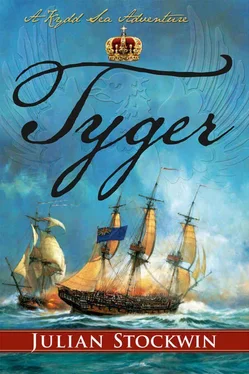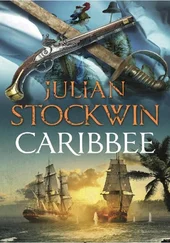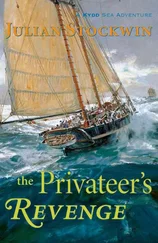The ship’s clerk called each man’s name and rate from the muster roll. The shore clerk sang out his entitlement as he approached the table, cap in hand: the amount was carefully counted into it from the chest and the man returned to his shipmates.
Kydd remained to see every one of L’Aurore ’s some two hundred-odd men step up and receive their due. Some touched their forehead; others, avid for a spree ashore, hurried off, but he knew each man and could place them with entire trust in any one of a hundred situations, fearful or challenging, dire or victorious.
And now all were lost to him.
In the afternoon the boats started heading ashore, carrying them and their sea-bags filled with treasured possessions-curios from far parts of the world, beautifully worked scrimshaw and tiny model ships. Soon, all over England, there would be delighted reunions: wives, sweethearts and families, children awestruck at the exotic being that was their sailor-father.
Village taverns in the summer evenings would crowd around the homecoming mariner, pots of ale pressed on him, and in return they would be regaled with tales of the high seas and confusion brought to the King’s enemies by one who could claim to have sailed under the knighted hero of Curacao.
Kydd took refuge in his great cabin but some came to pay their respects before they left. He found words for each of them: Poulden, his coxswain, Doud, Stirk, others. Most were tongue-tied, overcome by the final parting, mumbling their farewells and blindly turning away.
And then the ship was empty.
Echoing mess-decks, no watch-on-deck, the helm abandoned. A chill wind, a flurry of rain and endless stippled grey water.
The actual ceremony of decommissioning was a subdued affair. With only the standing officers, a few dockyard workers and his officers witnessing, Kydd’s pennant was struck from the main masthead where it had flown night and day since from that time before Trafalgar when it had proudly mounted up. It was solemnly presented to him, and then, in accordance with the immemorial custom of the sea, the ship’s cook went aft and lowered the ensign.
It was finished.
“SO KIND IN YOU TO CALL, Sir Thomas.” The first lord of the Admiralty was in an affable mood and had quickly found time for a now legendary frigate captain. “I heard about L’Aurore . Hard luck, old fellow.”
“Thank you, my lord. It will be quite some months, I fear, before L’Aurore is fit for service. We’ll know more after she’s docked.” Mulgrave was a not unsuccessful army general and therefore could not be expected to feel the void in Kydd’s soul.
“Yes, yes. I heard you brought back a travelling earl caught up in that business in Constantinople.”
“Lord Farndon, sir.”
“And jolly grateful he must have been, undoubtedly. Well, now, and you’ll be taking some time to be with your family, no doubt. Pray don’t neglect us here, Sir Thomas-you are at some eminence in the public eye and the government is always proud to be associated with such a one.”
“I will, my lord, although I do feel I should stand by my ship as she repairs.”
“Well, yes, we’ve been giving thought to that. You are, of course, unemployed as of your pennant being struck.”
“Yes, sir, but it doesn’t signify. I shall wait for L’Aurore to be made good, however long it takes.”
“Ah. Don’t you consider a trifling twelve-pounder of the breed just a little beneath the notice of a distinguished captain such as yourself?”
“Why, no, my lord. She’s tight and true and I’ll wait until-”
“Nonsense. The public would never stand for it. There is a better course-I’m appointing you to a brand-new heavy frigate. A thirty-eight no less, and all eighteen-pounders! From the best shipyard in the country, Buckler’s Hard, and to the latest design. What do you think of that?”
So there was no waiting for his ship’s restoring: now he had lost his dear L’Aurore altogether and another would know her and her sweet ways. “I … I thank you, my lord.”
Mulgrave’s brow creased. “I would have thought such a prospect would bring more joy than you show, Sir Thomas?”
“Oh, I’m deeply honoured, my lord,” Kydd said, adding hastily, “I’m merely thinking of the much greater responsibilities a heavy frigate brings.”
The frown cleared. “Good. I’m sure you’ll be equal to the burden. Then you’ll accept?”
“I … Yes, sir.” It felt a betrayal, like casting off an old love to run with a younger.
“Excellent. I shall immediately let it be known in the proper quarters. The broadsheets will love it.”
“Sir, what is her name, at all?”
“Name? She has none! Only at the launching, I’m told. I’m sure the Navy Board has a right fearsome-sounding tally to an ocean-bounding beast such as her. Why don’t you go down and sight your new command?”
There was a lot to take in. The most immediate was that the ship was still building, and while the launching was set for five weeks hence, with fitting out and trials it could be anything up to half a year or more before he was once again at sea. The pace of his life had, in one stroke, fallen to an amble.
So he would have more than enough time to visit Renzi and his sister at their estate. His spirits rose at the thought-he hadn’t even seen their castle or whatever it was that Lord and Lady Farndon called home, and it tickled his fancy to think to see his sister topping it the countess.
There were details to attend to first, however.
This was a complete break with the past in so many ways. His shipboard possessions must be landed and stored-or should he take the opportunity later to outfit his cabins entirely anew?
And what of the two last remaining of L’Aurore ’s complement still with him? Dillon, his confidential secretary, had so ardently wanted to see the sea and the world. Now there was no more for him to do and, reluctantly, Kydd must let him return to where he’d begun, lent by Renzi from his estate. Guiltily he pictured the tanned young man, who’d come so far and seen so much, now having to revert to being a country-house under-secretary.
And the other, the devoted Tysoe, his valet, who’d looked after Kydd since his early days as a lieutenant.
No-he couldn’t do it to the man!
Of all L’Aurore ’s company, only Tysoe would follow him into his new existence.
It was time to spy out his new ship. He took a leisurely coach to the south coast, first spending a day or two with his parents in Guildford, his blind old father and plain-speaking mother, neither having any conception of the world he lived in but fiercely proud of him-and now so immeasurably distant from his present being.
Buckler’s Hard was on the west side of the Beaulieu river, which met the Solent opposite the Isle of Wight. A private yard, it was at the edge of the ancient forests to the south, the slipways of the shipbuilders occupying a gentle slope down to the river with buildings of the humbler sort on either flank.
There was a large vessel on the stocks nearly complete and several smaller, one unmistakably a brig-sloop like Teazer and another mere gaunt ribs reaching for the sky. It was a busy scene-ship-wrights and their quartermen, apprentices, shipsmiths, labourers, on stages and underneath the vast hulls.
As Kydd walked closer, the rich stink of wood shavings, bubbling tar, varnish, and the smoke from charcoal braziers enveloped him, and the faint sounds of industry became more insistent: the rhythmic thock of shores being set up with mauls, the muffled thud of an adze, the buzz of saws, all set against a discordant background of taps and clunks of hammer and chisel, caulking irons and persuaders of every kind.
Читать дальше









